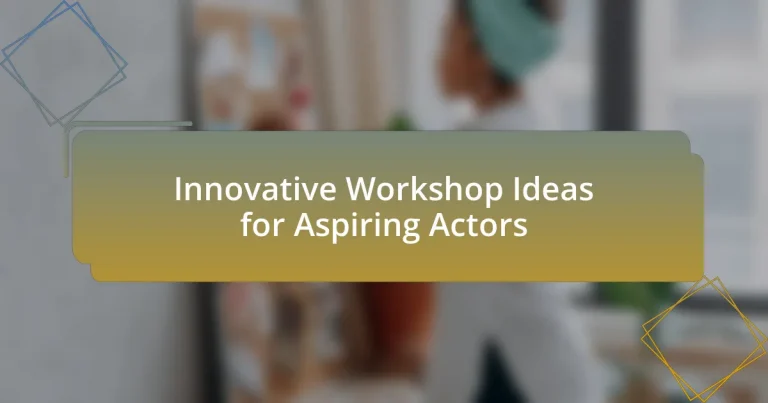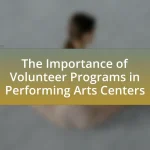The article focuses on innovative workshop ideas for aspiring actors, highlighting various formats and techniques that enhance their skills and creativity. It discusses the benefits of immersive role-playing sessions, genre-specific training, and collaborative workshops, emphasizing the importance of hands-on experience and feedback from industry professionals. Key skills developed through these workshops include improvisation, character analysis, and emotional expression, which are essential for effective performance. Additionally, the article explores the differences between workshops and traditional acting classes, the role of creativity in acting, and practical tips for maximizing the workshop experience.

What are Innovative Workshop Ideas for Aspiring Actors?
Innovative workshop ideas for aspiring actors include immersive role-playing sessions, where participants engage in real-time scenarios to enhance their improvisation skills. These workshops can incorporate techniques from renowned acting methods, such as Stanislavski or Meisner, to deepen emotional connection and authenticity in performances. Additionally, workshops that focus on specific genres, like film noir or Shakespearean drama, allow actors to explore diverse styles and techniques, fostering versatility. Research indicates that experiential learning, such as participating in mock auditions or scene studies, significantly improves actors’ confidence and skill sets, making these workshop formats effective for professional development.
How can workshops enhance the skills of aspiring actors?
Workshops enhance the skills of aspiring actors by providing structured training, practical experience, and feedback from industry professionals. These environments allow actors to practice various techniques, such as improvisation, scene study, and character development, which are essential for honing their craft. Research indicates that hands-on learning experiences, like those offered in workshops, significantly improve performance skills and confidence levels in actors. For instance, a study published in the Journal of Theatre and Performance found that participants in acting workshops reported a 30% increase in their ability to perform under pressure, demonstrating the effectiveness of such training.
What specific skills can be developed through acting workshops?
Acting workshops can develop specific skills such as improvisation, character analysis, emotional expression, vocal projection, and physical movement. Improvisation enhances spontaneity and creativity, allowing actors to think on their feet. Character analysis teaches actors to understand and embody different roles, deepening their performance. Emotional expression helps actors convey feelings authentically, which is crucial for connecting with audiences. Vocal projection improves clarity and volume, ensuring that performances are heard and understood. Physical movement skills enhance an actor’s ability to use their body effectively on stage, contributing to a more dynamic performance. These skills are essential for aspiring actors to succeed in their craft.
How do workshops differ from traditional acting classes?
Workshops differ from traditional acting classes primarily in their structure and focus. Workshops typically emphasize practical, hands-on experience and often concentrate on specific skills or techniques, allowing participants to engage in intensive practice and immediate application. In contrast, traditional acting classes usually follow a more structured curriculum that covers a broader range of foundational concepts over a longer period, including theory, scene study, and character development. This distinction is evident in the format; workshops often feature guest instructors or industry professionals who provide specialized insights, while traditional classes are usually led by a consistent instructor who guides students through a comprehensive program.
Why is creativity important in acting workshops?
Creativity is important in acting workshops because it fosters unique expression and enhances performance skills. In acting, creativity allows participants to explore diverse characters, emotions, and scenarios, which leads to a deeper understanding of the craft. Research indicates that creative exercises in workshops can improve improvisational skills and adaptability, essential traits for actors in dynamic environments. For instance, a study published in the Journal of Creative Behavior found that engaging in creative activities significantly boosts problem-solving abilities, which are crucial for actors when interpreting scripts and developing roles.
How can innovative approaches foster creativity in actors?
Innovative approaches can foster creativity in actors by introducing unconventional techniques that challenge traditional methods of performance. For instance, immersive experiences, such as site-specific theater or interactive storytelling, encourage actors to explore their characters in diverse environments, enhancing their adaptability and imaginative capabilities. Research by the University of Exeter highlights that engaging in varied artistic practices, like improvisation and physical theater, significantly boosts creative thinking and problem-solving skills in performers. This evidence supports the notion that innovative methods not only expand an actor’s skill set but also deepen their emotional connection to the material, ultimately leading to more authentic and dynamic performances.
What role does improvisation play in creative workshops?
Improvisation plays a crucial role in creative workshops by fostering spontaneity and enhancing participants’ ability to think on their feet. This practice encourages actors to explore their creativity without the constraints of a script, allowing for greater freedom in expression and collaboration. Research indicates that improvisational exercises can improve communication skills and build confidence, as participants learn to react and adapt to unexpected situations. For instance, a study published in the Journal of Applied Arts and Health highlights that improvisation in workshops leads to increased engagement and a deeper understanding of character development among actors.
What types of innovative workshop formats exist for aspiring actors?
Innovative workshop formats for aspiring actors include immersive experiences, online collaborative sessions, and physical movement-based workshops. Immersive experiences, such as site-specific performances, allow actors to engage with their environment, enhancing their adaptability and creativity. Online collaborative sessions leverage technology to connect actors from different locations, fostering diverse perspectives and networking opportunities. Physical movement-based workshops, like those incorporating dance or martial arts, help actors develop body awareness and physicality essential for performance. These formats are increasingly popular as they cater to the evolving needs of actors in a dynamic industry.
How do collaborative workshops benefit aspiring actors?
Collaborative workshops benefit aspiring actors by providing them with practical experience and opportunities for networking. These workshops create a space where actors can engage in scene work, receive immediate feedback from peers and instructors, and develop their skills in a supportive environment. Research indicates that collaborative learning enhances creativity and problem-solving abilities, which are crucial for actors in developing their craft. Additionally, networking during these workshops can lead to future collaborations and job opportunities, as actors connect with industry professionals and fellow creatives.
What are the advantages of online versus in-person workshops?
Online workshops offer greater accessibility and flexibility compared to in-person workshops. Participants can join from any location, eliminating travel time and costs, which is particularly beneficial for aspiring actors who may not live near major acting hubs. Additionally, online workshops often provide a wider range of scheduling options, allowing individuals to choose sessions that fit their personal schedules. This flexibility can lead to increased participation rates, as evidenced by a report from the Online Learning Consortium, which found that online learning environments can enhance engagement and retention. Furthermore, online platforms can facilitate diverse interactions through various multimedia tools, enriching the learning experience.
How can aspiring actors choose the right workshop for their needs?
Aspiring actors can choose the right workshop for their needs by assessing their specific goals, skill levels, and preferred acting styles. Identifying personal objectives, such as improving improvisation skills or preparing for auditions, helps narrow down options. Researching the workshop’s curriculum, instructor credentials, and participant reviews provides insight into the quality and relevance of the training offered. Additionally, considering the workshop format—whether in-person or online—can influence the decision based on individual learning preferences.
What are some unique themes for acting workshops?
Unique themes for acting workshops include “Emotional Intelligence in Performance,” which focuses on understanding and expressing complex emotions, and “Character Development through Personal Experience,” where participants draw from their own lives to create authentic characters. Another theme is “Improvisation and Spontaneity,” emphasizing quick thinking and adaptability in performance. Additionally, “Physical Theatre and Movement” explores the use of body language and physicality in storytelling, while “Cultural Storytelling” encourages actors to explore narratives from diverse backgrounds. These themes are supported by the growing recognition of the importance of emotional depth and cultural representation in contemporary acting practices.
How can genre-specific workshops enhance an actor’s versatility?
Genre-specific workshops enhance an actor’s versatility by providing targeted training that develops skills unique to various performance styles. These workshops focus on specific genres, such as drama, comedy, or musical theater, allowing actors to explore the nuances and techniques that define each genre. For instance, a study by the American Theatre Wing highlights that actors who participate in genre-specific training demonstrate improved adaptability in their performances, as they learn to embody different character types and emotional ranges. This specialized training equips actors with a broader skill set, enabling them to tackle diverse roles and increase their marketability in the competitive acting industry.
What benefits do workshops focused on character development provide?
Workshops focused on character development provide aspiring actors with enhanced emotional intelligence and deeper character understanding. These workshops facilitate the exploration of complex emotions and motivations, allowing participants to embody their characters more authentically. Research indicates that immersive character work can lead to improved empathy and interpersonal skills, which are crucial for effective acting. For instance, a study published in the Journal of Applied Arts and Health found that engaging in character-driven exercises significantly boosts participants’ ability to connect with diverse perspectives, thereby enriching their performances.
What practical tips can aspiring actors apply when attending workshops?
Aspiring actors can enhance their workshop experience by actively participating, networking with peers, and seeking constructive feedback. Active participation involves engaging fully in exercises and improvisations, which helps build confidence and skill. Networking with fellow participants and instructors can lead to valuable connections in the industry, as many successful actors emphasize the importance of relationships formed in workshops. Seeking constructive feedback allows actors to identify areas for improvement and refine their craft, as noted in studies showing that feedback is crucial for skill development in performing arts.


